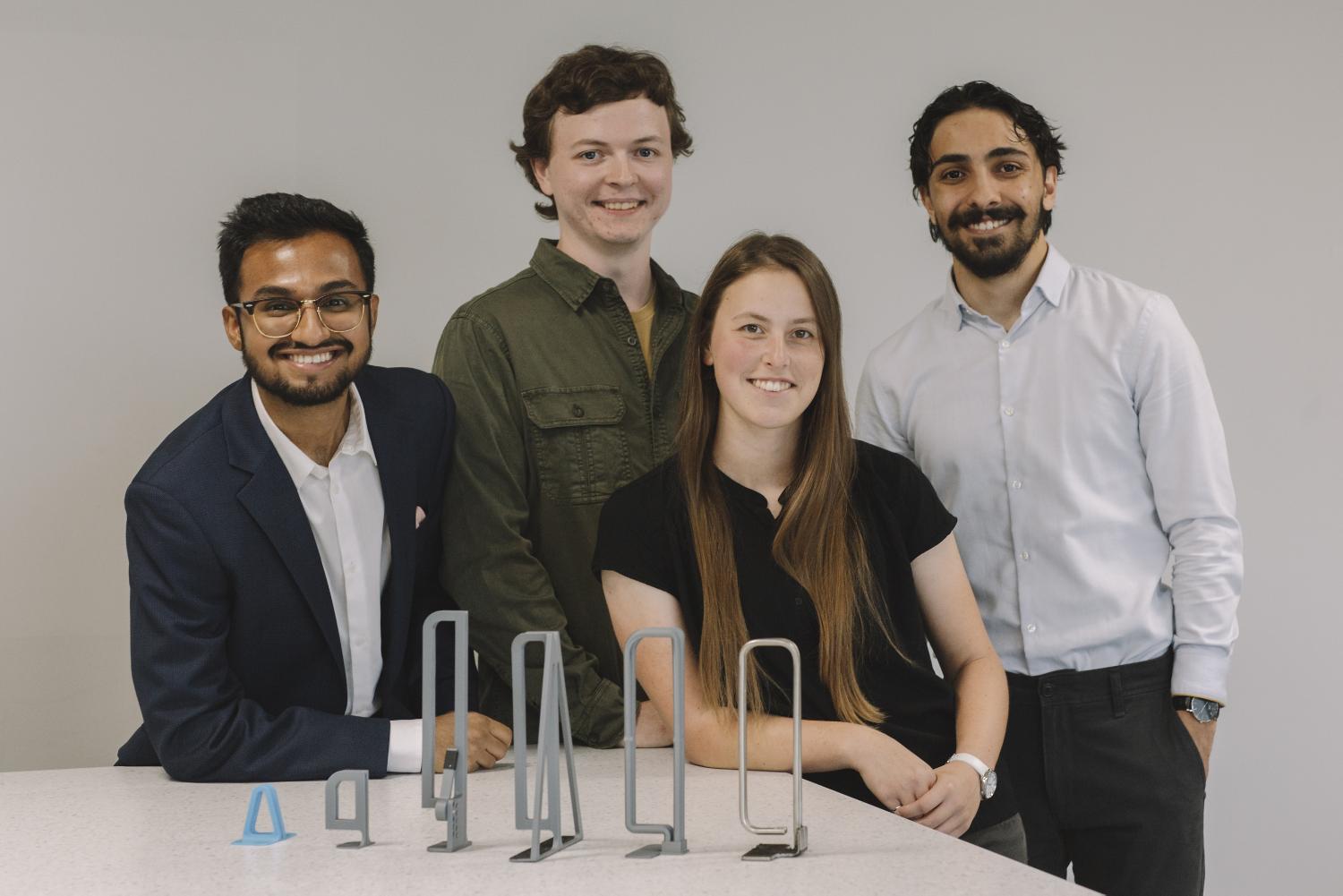

Assistive tool to make preparing food more accessible awarded Canadian James Dyson Award.
Cost-effective ‘Taco’ works with any knife and cutting board for a safer way to prepare food.
September 7, 2022 – As the world’s population ages, a growing number of individuals are finding it challenging to retain their independence in the kitchen. While there are some assistive cutting boards on the market, their limitations are vast – they are incompatible with personal knives and cuttings boards already owned, can be difficult to clean and limit the user’s range of motion. This year’s Canadian James Dyson Award national winner aims to solve this with Taco – an assistive device for the kitchen that allows users to slice food thinner, straighter and safer.
Unlike others, Taco works with knives and cutting boards already owned. The McMaster University team of engineers designed two tubular guides to ensure the knife follows a downward and perpendicular cutting motion, while restricting movements laterally to help keep it safe for the user. The simple design is dishwasher safe and features an extended gap between the bottom plate and the guides to ensure it works with a wide range of cutting board thickness.
-

-
Eden Lazar, McMaster University, “While volunteering at an old age home I met Beatrice, a wonderful home cook who was living with Parkinson’s disease. Her love for cooking was disrupted by uncontrollable, painful tremors in her hands, making food slicing challenging and unsafe. Beatrice helped us realize we could design an accessible device for those wanting to independently cook but required some assistance.”
Winning the national leg of the James Dyson Award will inject $7,500 into Taco.
Afeef Khan, McMaster University, “We are thrilled to be selected as the Canadian winner of the 2022 James Dyson Award. Our goal with Taco has always been to bring accessible cooking preparation to homes around the world. To bring us closer to this goal, we want to put our winnings back into Taco by preparing it for sale.”
The McMaster University team developed several prototypes of Taco. The first prototype was 3D printed, however after initial testing it didn’t perform well. Changes were made to the geometry of the product and after many incremental design changes and multiple tests, a final prototype design was made using kitchen-grade stainless steel. Testers, including Beatrice, were elated after trying the final prototype design and seeing how easy and safe it was to use.
Rachel Zimmer, 2022 James Dyson Award judge and partner at Entrepreneur First, “Sometimes the best innovation can come from a simple yet brilliant design. Taco embodies just this – a great product, solving a problem, from an inspiring team of young inventors."
Taco will progress to the international stage of the James Dyson Award and the McMaster University team aims to commercialize this product. The International shortlist will be announced on October 12th and the International winners on November 16th.
National Runners-Up
Polyformer – Plastic Bottles to Filament in Rwanda, Swaleh Owais and Reiten Cheng, McMaster University
Problem: While working at a 3D printing centre in Rwanda, we learned that many students, designers, and entrepreneurs did not use the 3D printers due to the high price of importing filament into the country. Additionally, we observed the lack of available infrastructure to recycle plastic bottles in the country.
Solution: Polyformer is a custom opensource machine that recycles waste plastic bottles into 3D printer filament. It can turn almost any plastic bottle into 3D printer filament. Using the custom bottle cutter mechanism, the user cuts a plastic bottle into a continuous strip, which is then fed into the Polyformer extruder. After the filament is extruded from the nozzle, it’s cooled and wrapped around the spool, which can then be inserted into any FDM 3D printer. The Polyformer has already been built in 10+ countries worldwide.
Bio-Brick, Adrian Simone, Rania Al-Sheikhly, University of Waterloo
Problem: The construction supplies industry is responsible for 23% of global carbon emissions and the mining of nearly 60 billion tons of raw material every year.
Solution: Bio-Brick uses a naturally occurring microbial process to form bricks of comparable durability and strength of a regular brick, while producing less carbon emissions. The microbial process, which uses a bacteria called Sporosarcina Pastuerii, speeds up the process of bonding the particles together throughout the entire brick.
Discover Dyson

